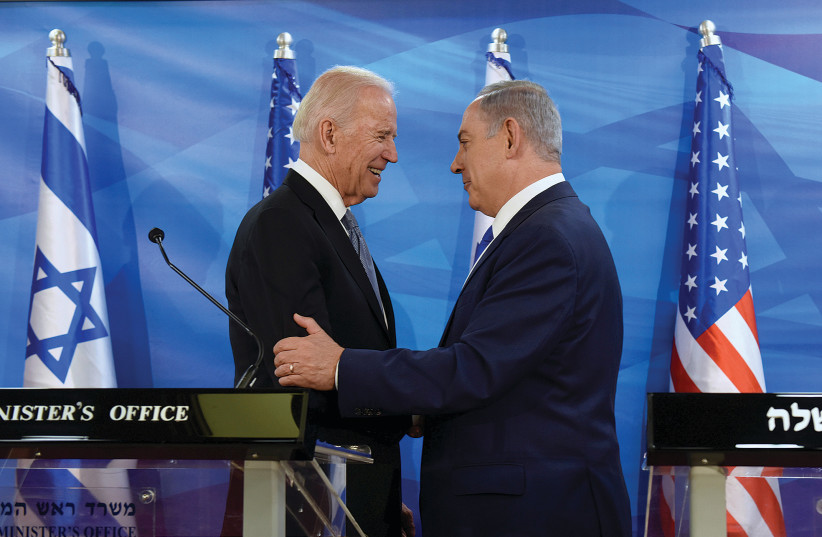Prime minister-designate Benjamin Netanyahu stressed that Israel and the US have maintained a close relationship under both Republican and Democratic presidents during a speech to the Republican Jewish Coalition on Saturday. This is the first time Netanyahu has addressed the political group.
Referring to his relationship with US President Joe Biden, Netanyahu pointed out that the two have been friends for 40 years, adding that while the two disagree at times "this is disagreement within the mispacha (family)."
"I've had the privilege of dealing with several American presidents and I can tell you even though there were occasional differences - by the way with Republican and Democratic presidents - I value the constancy of the American-Israeli alliance because it is a partnership between peoples," said Netanyahu.
Discussing military aid received from the US, Netanyahu pointed out that even though he disagreed on some issues with then-president Barack Obama, the two signed an extension of the ten-year support plan to Israel worth about $38 billion.

The prime minister-designate stressed that the "vast majority" of Americans support Israel, pointing to a Gallop poll which found that there was broad support among the American public for Israel.
"It is an alliance between nations of a common civilization and it's not just that it's even more than that. Remember Israel is the promised land. America is the new promised land. I have my offices in Jerusalem. America was to be the new Jerusalem."
Netanyahu also spoke about his speech before Congress in 2015, when he spoke out against the JCPOA nuclear deal with Iran.
"I can assure you that it wasn't a simple decision, it wasn't a simple decision to go to a joint session of Congress and challenge the policy of the sitting president whom I respected. I disagreed with, but I respected," said Netanyahu. "I made that decision because I believed then as I do now that disagreement endangered the very existence of the State of Israel and I wasn't going to let these ayatollahs end the Odyssey, the saga of the Jewish people."
"I'll do everything in my power to prevent them from getting nuclear weapons and the means to deliver them to us and by the way to you too. If that meant taking a stand against a sitting administration then so be it and I did it, but not haphazardly and not lightheartedly. It was a difficult decision."
Referring to the Abraham Accords, the prime minister-designate told the RJC meeting that the agreements were reached once he and then-president Donald Trump agreed to bypass the Palestinians and speak directly with the Arab states.
"The mindset that had congealed both in Jerusalem and in Washington was that you cannot break out into additional peace treaties in the Arab world unless you first have peace with the Palestinians. There was one problem with that assumption. The Palestinians didn't want and don't want peace with Israel. They want peace without Israel."
Netanyahu pointed to the growing economic and military strength of Israel and the growing threat from Iran as the two main reasons that it was possible to sign the Abraham Accords.
Referring back to his 2015 speech to Congress, Netanyahu stated that he began receiving calls after the speech from the Gulf states saying they were interested in cementing ties further.
Trump claims Israel-US relations 'not strong' under Biden
Former President Trump addressed the RJC meeting as well, claiming that the alliance between Israel and the US is "not strong now" under the Biden administration.
"I was proud to be the greatest friend Israel has ever had in the White House," said Trump pointing to the move of the US embassy to Jerusalem and the recognition of Israel's sovereignty over the Golan Heights.
Trump additionally stated that his administration worked with Israel to "destroy" ISIS.
After repeating claims that the results of the 2020 election were a "sham," Trump claimed that he would have brought "many more countries" into the Abraham Accords. "We would have I think by this time, 10, 12, 14, we would have had maybe all of them, that includes Saudi Arabia, we would have had all of them I think within a short time after the election."
The former president claimed that Biden has "betrayed Israel and the Jewish community," referring to attempts to return to the JCPOA deal. He additionally claimed that Biden had "disgracefully smeared Israel for defending itself" during rocket attacks.
In both Operation Guardian of the Walls in 2021 and Operation Breaking Dawn earlier this year, Biden made statements stressing Israel's right to defend itself, expressing pride in US support of the Iron Dome system.
During his visit to Israel earlier this year, Biden repeatedly referenced his strong connection to Israel and committed to increasing cooperation on defense systems.
“Every chance to return to this great country, where the ancient roots of the Jewish people date back to biblical times, is a blessing,” said Biden during his July visit. “The connection between the Israeli people and the American people is bone deep, and generation after generation that connection grows. We invest in each other. We dream together.”
